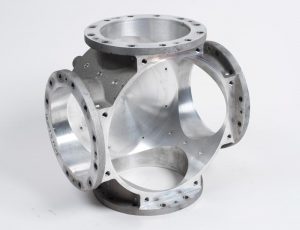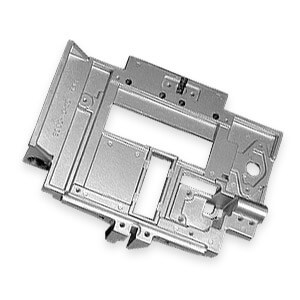Just How Light Weight Aluminum Foundries Contribute to Numerous Industries: A Detailed Overview
Aluminum factories offer as necessary vendors throughout several sectors, consisting of automobile, aerospace, building and construction, and electronic devices. They create elements that are not only lightweight but likewise long lasting, improving the performance of various products. With innovative casting strategies and a commitment to sustainability, these shops are adapting to fulfill advancing market demands. As they introduce, the influence of light weight aluminum castings on different applications elevates essential concerns regarding the future of production. What lies in advance for this essential industry?
The Role of Light Weight Aluminum Foundries in the Automotive Sector
As the auto market increasingly embraces lightweight products to boost gas efficiency and efficiency, aluminum factories play a vital duty in this advancement. These centers focus on the manufacturing of light weight aluminum spreadings, which are important parts in modern automobiles. By providing high-strength, lightweight parts, aluminum foundries make it possible for suppliers to minimize the general weight of cars, inevitably bring about enhanced fuel economic climate and reduced emissions.
Aluminum's resistance to corrosion additionally boosts lorry longevity, making it an eye-catching selection for car manufacturers. Foundries utilize advanced techniques such as die spreading and sand spreading to develop precise and detailed components, ensuring that they satisfy rigorous market requirements. Additionally, the capability to recycle light weight aluminum effectively adds to a more sustainable production process. As the auto market remains to introduce, aluminum foundries will continue to be crucial in supplying the products essential for the future generation of cars, sustaining both performance and environmental goals.

Aerospace Applications of Light Weight Aluminum Castings
Light weight aluminum castings are essential to the aerospace sector, using a mix of lightweight strength and resilience that is important for aircraft performance. These castings are made use of in different elements, such as engine parts, structural structures, and touchdown gear, where weight decrease is crucial for fuel effectiveness and total security. The convenience of light weight aluminum allows for complicated geometries that boost aerodynamic effectiveness while keeping structural integrity.
Additionally, improvements in casting technologies have enhanced the accuracy and surface area coating of aluminum components, reducing the requirement for comprehensive post-processing. This efficiency not just increases manufacturing timelines however also lowers prices, making aluminum an eye-catching option for makers. The deterioration resistance of aluminum warranties long life and reliability in severe operating atmospheres, further developing its function in aerospace applications. As the market develops, aluminum spreadings remain to be a vital product, driving advancement and sustaining the development of next-generation aircraft.
Building Industry Developments With Light Weight Aluminum
The building and construction industry has actually increasingly adopted light weight aluminum due to its lightweight residential properties and versatility, paralleling its successful applications in aerospace. Innovations in aluminum style have actually brought about more powerful, extra reliable frameworks, allowing architects and home builders to check out brand-new possibilities. The product's resistance to rust and low upkeep needs make it especially appealing for both commercial and property projects.
Light weight aluminum's versatility facilitates the production of elaborate styles, permitting aesthetic enhancements that were formerly tough with standard products. Prefabrication techniques have actually likewise evolved, utilizing light weight aluminum to reduce building time and expenses significantly. In addition, the energy efficiency of aluminum systems-- such as home window frames and roof covering-- adds to lasting building practices, straightening with modern-day ecological requirements. As the construction sector proceeds to accept these developments, light weight aluminum's role is expected to expand, driving more innovation and adding to the development of durable frameworks.
Electronics and the Demand for Lightweight Aluminum Components
With the fast improvement of technology, the need for lightweight aluminum components in the electronics industry has actually surged. As gadgets become more mobile and compact, suppliers seek materials that offer both resilience and weight reduction. Light weight aluminum, with its superb strength-to-weight proportion, has actually become a favored choice for parts such as coverings, warmth sinks, and structural assistances.
Making use of aluminum not just enhances find more info product performance yet likewise adds to energy efficiency, as lighter tools require much less power during operation. In addition, aluminum's excellent conductivity makes it excellent for electronic applications, making sure efficient heat dissipation and decreasing the threat of getting too hot.
As customer choices change in the direction of smooth and lightweight gizmos, aluminum shops play a crucial role in fulfilling the evolving demands of the electronics sector (Precision aluminum casting). Their ability to produce high-grade and precise light weight aluminum components supports technology, allowing makers to push the boundaries of layout and functionality
Sustainable Practices in Aluminum Foundries
As the electronic devices industry significantly prioritizes sustainability, light weight aluminum shops are adjusting their practices to line up with these ecological objectives. Many foundries are executing recycling programs that recover light weight aluminum scrap, greatly reducing the demand for resources and decreasing waste. By using energy-efficient innovations, these centers are reducing their carbon impact; as an example, utilizing electrical heaters rather of typical gas-fired ones can result in considerable energy cost savings.
In addition, light weight aluminum factories are investing in water conservation actions, such as closed-loop systems that recycle water utilized in cooling processes. These techniques not only reduced water consumption yet likewise minimize the environmental impact connected with wastewater discharge. Additionally, many shops are discovering renewable power resources, such as solar and wind power, to satisfy their power requires sustainably. Through these initiatives, light weight aluminum shops exhibit a commitment to ecological stewardship while remaining to fulfill the needs of the electronic devices sector.
Future Fads in Aluminum Shop Technologies
Emerging technologies are poised to change light weight aluminum factories, improving efficiency and product top quality while progressing sustainability initiatives. Innovations such as man-made intelligence and device Our site learning are anticipated to enhance manufacturing processes by predicting tools failings and enhancing resource allowance. The integration of innovative robotics will certainly improve operations, decreasing labor expenses and lessening human mistake.
Additive manufacturing, or 3D printing, is additionally gaining traction, allowing the manufacturing of complex geometries that were formerly unattainable with standard methods. This shift might bring about substantial product cost savings and lowered waste. In addition, wise factories using IoT (Internet of Points) modern technologies will make it possible for real-time monitoring and data evaluation, cultivating proactive decision-making.
Finally, the adoption of cleaner melting modern technologies and reusing strategies will certainly further decrease the ecological footprint of aluminum foundries, making them more sustainable. Jointly, these trends signify a future where aluminum shops can operate with greater performance and duty.
Frequently Asked Concerns
What Are the Environmental Influences of Aluminum Foundries?

How Do Foundries Make Certain Quality Assurance in Light Weight Aluminum Spreading?
Foundries ensure high quality control in aluminum casting by applying strenuous assessment procedures, utilizing innovative modern technology, conducting normal product testing, and sticking to sector standards, thereby keeping uniformity and dependability in their finished items. Precision aluminum casting.
What Is the Average Life-span of Light Weight Aluminum Cast Components?
The average life-span of aluminum cast parts usually varies from 10 to 50 years, depending on elements such as environmental problems, usage, and upkeep. Appropriate treatment can greatly enhance their durability and performance gradually.
How Are Light Weight Aluminum Alloys Selected for Details Applications?
Light weight aluminum alloys are chosen based on factors such as toughness, corrosion resistance, weight, and thermal conductivity. Designers assess the details needs of applications to figure out the most ideal alloy for finest performance and toughness.
What Are the Safety Rules for Light Weight Aluminum Factory Employees?
Security regulations for aluminum foundry workers include individual safety tools mandates, ventilation demands, exposure limitations to dangerous products, and protocols for taking care of molten steel. Conformity guarantees employee security and lessens wellness risks connected with foundry operations.
As the auto industry increasingly embraces light-weight products to boost gas efficiency and efficiency, light weight aluminum shops check that play a crucial function in this advancement. As consumer choices change towards lightweight and sleek devices, aluminum foundries play a vital role in meeting the developing demands of the electronic devices market. As the electronic devices industry significantly prioritizes sustainability, light weight aluminum foundries are adjusting their techniques to straighten with these ecological objectives. Several factories are carrying out recycling programs that reclaim aluminum scrap, significantly reducing the need for raw materials and minimizing waste. Security regulations for light weight aluminum foundry employees include personal protective equipment requireds, ventilation requirements, exposure limitations to unsafe products, and protocols for taking care of molten steel.